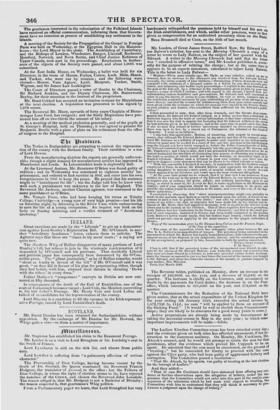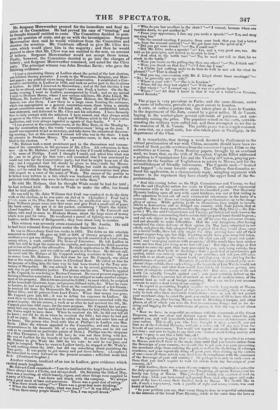The Ludlow Election Committee-room has been crowded every day; and
the evidence given on both sides has afforded amusement, if not in- struction to the numerous auditory. On Monday, Mr. Cockburn, Mr. Alcoek's counsel, said lie would not attempt to retain the seat for that gentleman, after the evidence which proved Mr. Coppock to be an agent. Ile admitted that the seat must be abandoned, on the ground of "treating ;" but he contended for liberty to proceed with the case against the Clive party, who had been guilty of aggravated bribery and corruption. The Committee passed a resolution-
" That Mr. Alcock, by his agents, was guilty of treating at the last election for the borough of Ludlow."
And they added-
" That in case Mr. Cockburn should have abstained from offering any evi- dence or further observations upon the allegation of bribery, under the im- pression that the Committee would not enter into this part of the case:in con- sequence of the admission which he bad made with respect to treating, the Committee wish him to understand that they will think it necessary to pro- nounce a judgment upon the charge of bribery."
Mr. Sergeant Mereweather pressed for the immediate and final de- cis ion of the Committee. He had proved his case of "treating," and Ile thought himself entitled to costs. The Committee decided to post- pone the question of costs, and go on with the investigation. Sergeant Mereweather then said he would withdraw from the Committee and abandon the scrutiny. Mr. Cockburn offered to give Mr. Clive five a tes which would place him in the majority ; and then he would
v c; a t show that Mr. Clive was not entitled to the seat, on account epme o f—b- ribery. Sergeant Mereweather would not accept those terms. Finally, however, the Committee decided to go into the charges of bribery ; and Sergeant Mereweather remained, and acted for the Clive party, The principal witness was John Brookes Revis ; who gave the following evidenceI kept a circulating library at Ludlow about the period of the last election, sad followed literary, pursuits. I wrote in the Worcester, Salopian, and Here- by' papers ; my political views being then Conservative. I established a Con- Fervative institution in Ludlow in 1836, and took an active part in the elections st Ludlow. In 1838 I iemoved to Shrewsbury ; and at the last election I was sent for to attend, and the messenger's name was Frail, a barber. On the Sa- turday evening, I went to Ludlow, accompanied by Cook ; and on my arrival I went to Denham House, where I saw various solicitors, Mr. John Lloyd, Mr. Williams, Mr. Luttrel Clark ; and Mr. William Holmes, the Member of Par- eameet, was also there. I saw them in a large room fronting the entrance, which was appropriated as a general committee-room, there bang a strictly private committee-room on the left-hand side, where all confidential letters were addressed, and delivered to Mr. Clive and his solicitors. I have formerly been in daily contact with the solicitors I have named, and they always acted as agents in the Clive interest. Lloyd and Williams acted in the Conservative Institution, and WCIC always regarded as agents of that family. *I * " I was present at the committee-room, at the Blue Boar, on the Monday be- fore the nomination day ; the words ' committee-room' being on the door. I myself was requested to act as secretary, and take down the minutes at the even- ing meeting ; but at this moment I cannot tell who was in the chair. I took the minutes to Denham House. The committee.room, in fact, was only a
blind to the electors. * * *
"Mr. Holmes took a most prominent part in the discussions and transac- tions of the committee, in the presence of Mr. Clive. All references, in fact, were ,ade to Mr. Holmes ; and I was asked by him if I could influence a voter el' du name of Phillips. I said I thought I could, and asked him what was the urn to be given for that vote ; and remarked that I was convinced he would not vote for the Conservative party, but that be might keep out of the way ; and I suggested that 50/. should be given to him,—both the Messrs. being within hearing. I went to Phillips, but could do nothing with him; and he voted for the Radical party. A similar conversation took place with respect to a voter of the name of 'Wade. The names of the parties to be bribed were written in a list, which was bracketed with the names of the particular individuals who were to influence or bribe them."
He told Mr. Holmes, that he thought Wade could be had for 500/.; he had refused 2301. He went to Wade to make the offer, but found that he had polled— He was told by Mr. John Williams that Frail was employed to do the dirty work at the election' as he was quite as fait at it. (Laughter.) Frail had a rr:tette room at the Blue Boar to see voters; he recollected once seeing Mr. John Williams junior come into that room and give Frail a small roll of paper like bank-notes, who put it in his pocket, exclaiming That's the ticket.' (Loud laughter.) He had frequent conversations with a Mr. Cornwall and others, who used to come to Denham House, about the large sums of money which were paid for votes. He recollected a parcel of fighting-men coming to Ludlow, under Brown of Bridg,enorth; they were about sixty in number.
This witness was severely cross-examined by Mr. Austin. He said he had been released from prison under the Insolvent Act— He was in Shrewsbury Gaol ten weeks in 1835. The debts on his schedule amounted to 2,0004 Ile gave up 500/. or 600/. of literary property; still his creditors never got one shilline. The property he left consisted of several works, among others, a work °natal The Gems of Literature. He left Ludlow in 1838, but still he kept his name on the registry, and answered the third question put to hini at the poll in the affirmative. He made application to Mr. Holmes for pecuniary assistance ; and was told to call again in a few days. Ile did not call. Ile never told Mr. Holmes of Mr. Coppock making overtures to him. He got no money from Mr. Holmes. The first time he saw Mr. Coppock, was about four or five weeks since, at his house in Cleveland Row. He called on him for the purpose of telling him the base way Ile had been treated by the Tory aris- tocracy of Shropshire. He was advised to do so by several gentlemen, as the only war to get retributive justice. The phrase was his own. When he applied to itle eopnock, he was living in Burton Crescent. He was at present engaged in forming a librarian association. Last year he was obliged to make another assign- ment of his property. His debts amounted to 3,000!.' to meet which, he assigned all his household furniture, type, and presses, billiard-table, 8:e. When he mune to London, he had no property ; he lived on the contributions of a few friends: he received 10/. from the Honourable Mr. Kenyon, 20/, from the Honourable :Robert Clive, and 20 guineas from Lord Powis. When that money was gone, Mr. Coppock gave him 501.; it was to defray his expenses to Ludlow. He went there to refresh his memory as to some circumstances connected with the present inquire. On his return, a week or so after he had received the 501., Mr. Coppock gave him 100/. more, for the same purpose. Mr. Coppock has not pro- mised him any more, but he said that he would do that for him which he thought the Tories ought to have done. When he received the 501., he did not tell all he knew ; nor did he do so when he received the 1001.. but since he had put it all on paper. Mr. Holmes, when he called on him, did not order him out of his house. The person who lived with him at Phillips's in Ludlow was Mrs. Bevis. (Here the witness appealed to the Committee, and said there were circumstances in his domestic life of a very painful nature, and he did not Ivish to be examined on particular points of them.) Phillips was the shopman of a Miss Thompson ; he lived with her' he was not then living with her. She was at Ludlow for the benefit of her health. It was he that suggested to Mr. Holmes to give Wade the 500/. for his vote : he said he was poor, and might be tempted. When lie went to Ludlow lately, he stopped at Mr. Wade's: lie said nothing oboist the 500/, but did say something about punishing the Tory party. It was partly to get money and put down bribery. (Laughter.) Be consented to came forward on the present Occasion; reflection made him do it. (Continued laughter.)
Another witness, landlord of an inn in Ludlow, gave evidence which excited much laughter.
_ Mr. Edward Cook examined—" I am the landlord of the Angel Inn,'in Ludlow. have always been a Clivite, and always shall. On Saturday the 18th of May, there was a meeting, at which brandy, cigars and other things were supplied to a party of Clivites. I sat down and drank' with the company. We always keep a good stock of ham and provisions. There was a good deal of eating."
"Was there much eating?'—" There was a great deal more drinking." " When the bottle was empty, what was done ? "—" It was filled again." "Were there many people drunk ? "—" Yes, I was myself drunk." "Who do you last recollect in the chair? "—" I cannot, because when one tumbles down, we put another in." • "From your appearance, I dare say you made a speech ?"—" Yes, and sang my song too."
"On the second meeting, I perceive from your book that 'nu had a better one, from the amount entered ?"—" We got more into the spirit of it."
"Did you get more drunk? "—" No, I could not."
"Did Mr. Clive make a speech? "—" Yes, and a very good one, too. He told us his principles, and desired us to stick to him." "And stick to the bottle too ? "—" No, he need not tell us that, for we
stuck to the bottle."
"Were you busier on the polling-day than any other? "—"No, 1 think not." "Were you drunk on that day ? "—" I dare say I was." "A Clivite had nothing more to do than to walk in and ask for what he
pleased ?"—" That is about it."
"Had you any conversation with Mr. J. Lloyd about those meetings ? "-- " No ; he generally saw my wife."
"Where is your wife ? ' —" She is in London." " Where did she sleep last night ? "—" With me."
"But where? "—" I cannot say ; but it was at a private house." " Where ? "—" All that I know is that it was at a tailor's—a German,
named Kriuski."



























 Previous page
Previous page